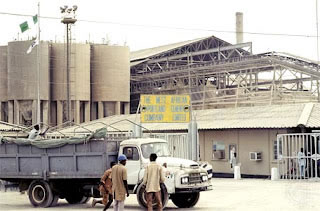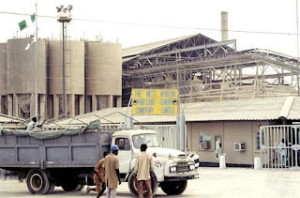
 Minister of Solid Minerals Development, Dr. Kayode Fayemi, has said that Nigeria is aiming to hand over the $4.5 billion Ajaokuta Steel Complex to private operators this year as part of a plan to kick-start its industrial and mining industries.
Minister of Solid Minerals Development, Dr. Kayode Fayemi, has said that Nigeria is aiming to hand over the $4.5 billion Ajaokuta Steel Complex to private operators this year as part of a plan to kick-start its industrial and mining industries.
The Ajaokuta Steel Company Limited (ASCL) has always been a pain in the neck of the successive Nigerian administrations. The Construction of Ajaokuta, which lies on the Niger River and was supposed to have an installed capacity of 5 million metric tonnes of steel a year, began in 1979.
Work was delayed by the government’s failure to pay the builders, Russia’s Tyazhpromexport (TPE) on schedule. Since 1983, the company has remained in the state of “near completion” with the elusive 100% completion status always out of its reach due to the lack of foresight or sheer laziness of the leaders of the country.
Since Nigeria’s return to democracy rule in 1999, the three different administrations had flexed muscles trying to find a befitting solution to the problem.
The Olusegun Obasanjo-led administration in 2003 decided to concession off the steel mill to an Indian company, Global Infrastructure. This ended up leaving the company worse off as the concessioners were accused of stripping the mill of its assets and carting it abroad.
According to the Ajaokuta Steel branch chairman of the Iron and Steel Senior Staff Association of Nigeria (ISSSAN), Comrade Abdulkareem Jimoh, at a time that “the concessionaires were just toying with the future of Nigeria.”
He alleged that instead of completing the primary plant, GIHL, was trading in iron ore and making billions of naira without showing commitments to revitalising the company.
“That was not the only reason for its failure though, as covert attempts were made by the West to truncate realisation of the dream. They are masters at applying subtle, but effective pressure on developing countries when they are not going in the path they have set for them and Nigeria becoming self-sufficient in steel production was not one of the successes Western Europe and America wanted Nigeria to achieve,” he said.
This agreement was revoked under the Umaru Yar’Adua administration in 2008, and this led to a legal conundrum between the country and Global Infrastructure which now has to be sorted out before revival plans for the company can be embarked on, according to Fayemi.
The revocation by Yar’Adua didn’t take into account that the concession had not expired, thus Global Infrastructure took the country to the Arbitration Court in the United Kingdom.
According to the minister, once the legal issues are sorted out, many parties have indicated interest in the revival of Ajaokuta, from Russians to the Chinese, including the original constructors of the plant, the Ukrainians.
He said they would consider the best option that would allow Ajaokuta back to work within the next 24 months.
The Ukrainian Ambassador to Nigeria, Valeriy Aleksandruk, has said that his country was ready to invest $1 billion into Ajaokuta Steel Company in order to revive the plant. The Ukrainian company that built the plant TPE had presented a proposal to the Federal Government to that effect and also that Morgan Stanley, the multinational financial services firm that would provide the $1 billion investment before taking any further steps.
There were initial fears that the plant’s facilities had become obsolete, but the sole administrator, Engr. Isah Joseph Onobere, refuted this. He said this was not so as speculated as most of what are used in steel refining was still in good condition.
He also said the technical audit report by the Ukrainians recently stated that the situation of the steel plant’s equipment and facility are satisfactory, giving it a clean bill of health.
“Mechanically, the Ajaokuta plant’s equipment and facilities are generally in good condition,” backing up his point, he said, adding that “the model operating with the basic oxygen blast furnace installed at Ajaokuta is as viable now as it was almost three decades ago and that the total world crude steel production as at December 2012 was 1.5 billion tonnes and 70 per cent was produced through the basic oxygen furnace technology, the blast furnace.”
“So, if as at December 2012 the world crude steel production of about 70 per cent was achieved through this technology then the technology in Ajaokuta remains the most acceptable and applied technology in iron making process, which has the capability of processing even the least acceptable grades of iron ore and it’s quite flexible in operation.”
Fayemi said only 18 steel companies were currently operating out of 30 steel companies existing in Nigeria with the production of 2.6 million tonnes of steel annually.
“This low quantity of steel Nigeria is producing necessitated the huge importation gap, as the country is consuming six million tonnes annually and the bulk of what the companies produced was from scrap and importation of billet from China.” According to him, the Nigeria Customs Service collects 12 per cent tax from steel importers to discourage importation and to support local industries.
If revamped, the Ajaokuta plant could employ no fewer than 10, 000 people and boost the economy of the country.
Furthermore, Ajaokuta could also produce over 110MW of electricity to meet its local consumption needs, while the remaining would be transferred to the national grid. The steel company has a lot of potentials which his country wanted to take advantage of and that already, meetings were on with relevant stakeholders in Nigeria for the realisation of the planned takeover of the plant
With what a completed Ajaokuta Steel Company (ASCO) holds for the growth of Nigeria’s economy, one wonders why successive governments in the country have failed to do the needful to ensure the steel firm comes fully on board after about 40 years of awarding the contract.
Most pathetic is to hear that the project, which has consumed over $5 billion, requires just about $650 million to be completed.
President Muhammadu Buhari, like others before him, seem to acknowledge the importance of resuscitating the steel mill in order to give the much-needed boost to the economy, diversify it and put Nigeria on the road to becoming an industrialised nation, but will this be another occasion to pay lip-service or will this be the real deal for the nation?
